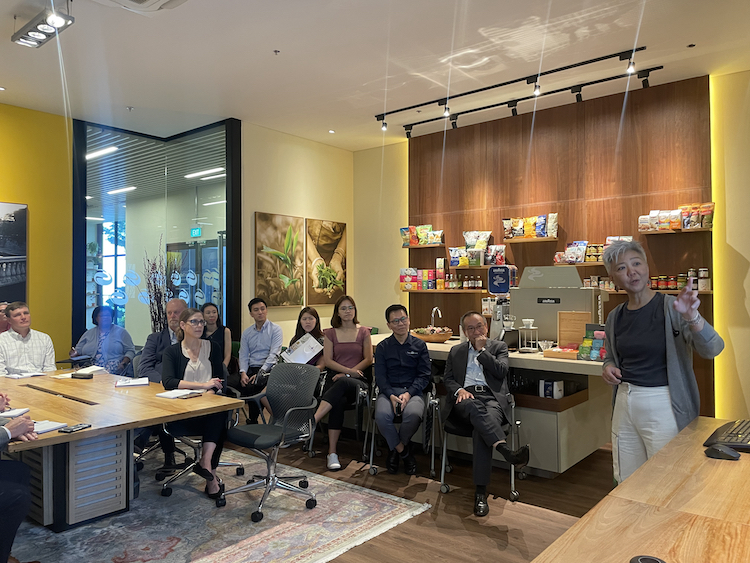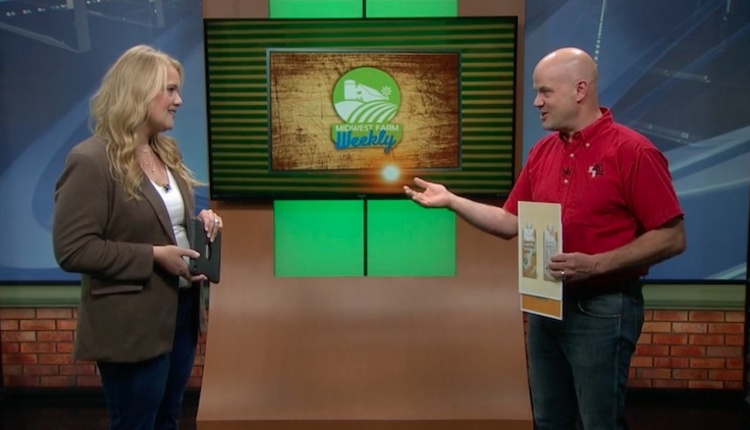
How do you ensure the freshest possible dairy products halfway around the world?
For Angela Low, co-founder of Gan Teck Kar Investments Pte Ltd aka GTK, the answer ultimately was building a cutting and shredding operation in Singapore, an island nation 12 times zones away from America’s East Coast. These days, her company can cut, shred, or slice up to 5 tons of U.S. cheese a day.
That cut-and-shred operation wasn’t an instant answer for GTK back in 2014 when they first started importing cheeses from the U.S. However, it’s an essential part of the business these days as GTK serves some of the world’s most prestigious companies. Clients include the Four Seasons, Hyatt, and Marriott hotel chains along with corporate companies such as Facebook, Apple, Netflix, Google, Goldman Sachs, and J.P. Morgan. Starbucks, Hard Rock Café, and Pizza Express rank among the nearly dozen restaurant chains GTK supplies to as do airlines and theme parks.
Low was asked by one of the visiting members from the U.S. Dairy Export Council (USDEC) as to why GTK had decided to get into the cheese conversion business. “It’s a challenge to import and distribute products with very short shelf life from halfway across the world. Retailers here require a minimum of six months of shelf life upon delivery to their stores. We thought we could optimize the shelf life by cutting and shredding 40-pound blocks,” she said. “Now, we typically order one to two 40-foot containers of cheese monthly from the U.S. As a full-service distributor, importing brands from all across the globe, GTK has 30 trucks in Singapore and Malaysia on the road and a staff of 150 employees to cater to both retailers and food service customers.
Indeed, GTK has come a long way from its days as a start-up in 1991.
A business builder
“Singapore is the melting pot of cuisines,” Low shared with the U.S. dairy farmer delegation and USDEC staffers. “Singaporeans are adventurous in their food choices, and the use of cheese can be found in various Asian cuisines. Our friend Martin has given us some great new ideas,” she added of Martin Teo, who serves as USDEC technical director for food applications in Southeast Asia.
As for getting into the cutting and shredding business, seeing and touring plants is one thing. Putting an operation into practice in Singapore where the temperatures routinely reach 90°F and 90% humidity on the equator is an entirely different endeavor.
“Oh, we had so much learning,” she said of seeing dairy processing plants in Wisconsin. “Once you buy equipment, you’re definitely committed. Yes, we were both legs in.”
Because of those higher ambient temperatures and high humidity, the company almost started making “blue” cheese. That was not the intention, and the blue cheese analogy was a nod to the mold that the team was dealing with.
That’s when Low and her team doubled down on the cut-and-shred endeavor. They installed industrial humidifiers and big-time air-handling units. That helped bring plant temperatures in the cheese preparation area to under 50°F and humidity levels under 50%. In addition, the GTK team started adding carbon dioxide and nitrogen gas to gas flush the bags of cheese. Those investments help improve the quality and extend the shelf life of the cheeses.
“To ensure we were complying with our quality control standards, we installed our own in-house lab to constantly check food quality,” added Low.
As for the scope of cheese business for the company? “They have the most U.S. cheese selection in retail,” said Daliah Ghazalay, USDEC regional director for Southeast Asia.
“We would like to import more,” quipped back Low. “However, the chillers and the dairy case in the region are much smaller than in U.S. retail outlets.”
To reach the next level
“U.S. dairy farmers and processors need to understand the importance of halal,” shared Low when discussing how her company and U.S. dairy could further grow sales in the region. “All our immediate neighbors are Muslim countries,” she said of Singapore’s neighbors that represent her company’s customers. “In this region, Subway has gone halal. Many other restaurants also are following that trend.”
To learn more about the how and why of halal, read “To grow, U.S. dairy needs to embrace halal.”
GTK deals not just with cheese but also distributes many other major U.S. food brands and works closely with other U.S. trade boards to market and promote the products. Low said, “It was a delight to host a USDEC visit, and we were honored to meet everyone, including President Krysta Harden. We appreciate the support of USDEC as we work toward increasing the volume of U.S. cheeses in the region.”








